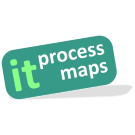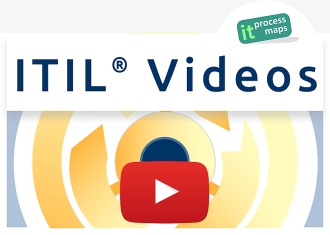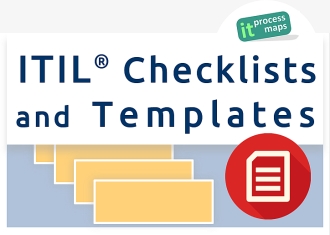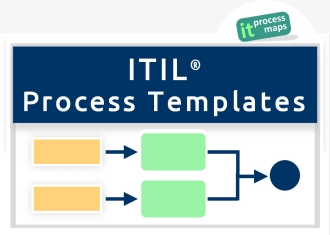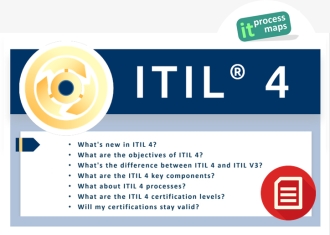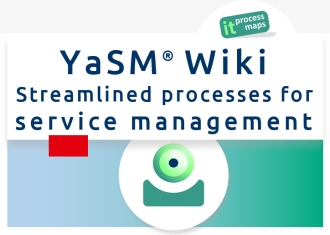Checklist Service Specification Sheet: Difference between revisions
No edit summary |
No edit summary |
||
| (3 intermediate revisions by the same user not shown) | |||
| Line 1: | Line 1: | ||
<itpmch><title>Checklist Service Specification Sheet | IT Process Wiki</title> | |||
<meta name="keywords" content="service spec sheet, service specification sheet, service specification template" /> | |||
<meta name="description" content="The Service Specification Sheet builds upon the Service Level Requirements, in that it compares the requirements from the viewpoint of the ..." /> | |||
</itpmch> | |||
<imagemap> | |||
Image:ITIL-Wiki-deutsch.jpg|right|Checklist Service Specification Sheet - Template Service Specification Sheet | |||
default [https://wiki.de.it-processmaps.com/index.php/Checkliste_Service_Specification_Sheet diese Seite auf Deutsch] | |||
desc none | |||
</imagemap> | |||
<br style="clear:both;"/> | |||
<p> </p> | |||
'''ITIL Process''': ITIL V2 [[Service Delivery]] - [[Service Level Management - ITIL V2]] | |||
The Service Specification Sheet builds upon the Service Level Requirements, in that it compares the requirements from the viewpoint of the client with how these requirements are actually fulfilled from a technical point of view. It is assumed that a bundle of internal IT Services is combined in order to deliver an external IT Service for the client. In this context, the IT | '''Checklist Category''': [[ITIL-Checklists|ITIL Templates]] - Service Level Management | ||
'''Source''': Checklist "Service Specification Sheet" from the ITIL Process Map V2 | ⯈ [https://en.it-processmaps.com/products/itil-process-map.html ITIL Process Map V3] | |||
<p> </p> | |||
The Service Specification Sheet builds upon the Service Level Requirements, in that it compares the requirements from the viewpoint of the client with how these requirements are actually fulfilled from a technical point of view. It is assumed that a bundle of internal IT Services is combined in order to deliver an external IT Service for the client. In this context, the IT Organization may opt to supply the internal IT Service with its own resources, or to use an external Service Supplier: | |||
* Name of the Service | * Name of the Service | ||
| Line 54: | Line 70: | ||
** Accounting method | ** Accounting method | ||
** Price of the IT Service for the client | ** Price of the IT Service for the client | ||
<p> </p> | |||
<html>By:  Stefan Kempter <a rel="author" href="https://www.linkedin.com/in/stefankempter"><img style="margin:0px 0px 0px 0px;" src="/images/bookmarking/linkedin.png" width="16" height="16" title="By: Stefan Kempter | Profile on LinkedIn" alt="Author: Stefan Kempter, IT Process Maps GbR" /></a>, IT Process Maps.</html> | |||
<!-- This page is assigned to the following categories: --> | |||
[[Category:ITIL V2|Service Specification Sheet]] | |||
[[Category:Checklist (ITIL)|Service Specification Sheet]] | |||
[[Category:Service Level Management|Service Specification Sheet]] | |||
<!-- --- --> | |||
Latest revision as of 19:02, 29 March 2019

ITIL Process: ITIL V2 Service Delivery - Service Level Management - ITIL V2
Checklist Category: ITIL Templates - Service Level Management
Source: Checklist "Service Specification Sheet" from the ITIL Process Map V2 | ⯈ ITIL Process Map V3
The Service Specification Sheet builds upon the Service Level Requirements, in that it compares the requirements from the viewpoint of the client with how these requirements are actually fulfilled from a technical point of view. It is assumed that a bundle of internal IT Services is combined in order to deliver an external IT Service for the client. In this context, the IT Organization may opt to supply the internal IT Service with its own resources, or to use an external Service Supplier:
- Name of the Service
- Clearance information (with location and date)
- Service Level Manager
- Clearance of the Service Specification Sheet by Service Management (confirmation that the requirements are able to be fulfilled and where necessary, specification of the conditions which must be fulfilled before the start of the Service)
- Capacity Manager
- Availability Manager
- IT Service Continuity Manager
- Financial Manager
- Service description
- Short description of Service
- Users of the IT Service on the client-side
- Breakdown of the offered Service into Service groups, e.g. along infrastructure components or IT applications
- For each Service group:
- Which Services are offered, e.g.
- Handling of Service interruptions (by telephone, by remote access, on site?)
- User Services (user administration, installation, …)
- What quality is required of the offered Services, e.g.
- Service times
- Availability requirements
- Number of interruptions allowed
- Availability thresholds(xx,xx %)
- Downtimes for maintenance (number of allowed Downtimes, pre-notification periods)
- Procedure for announcing interruptions to the Service (Planned/ unplanned)
- Performance requirements
- Required capacity (lower/upper limit) for the Service
- Allowed workload/ usage of the Service
- Response times from Applications
- Reaction and resolution times (according to priorities, definition of priorities e.g. for the classification of Incidents)
- Requirements for the maintenance of the Service in the event of a disaster
- Which Services are offered, e.g.
- Composition of the IT Service
- Relationship to other external IT Services
- Required internal IT Services
- Name of the Service
- Service Provider
- Reference to Operational Level Agreement (OLA)
- Required changes, if the OLA is not sufficient for the Service to be established
- Required externally procured IT Services
- Name of the Service
- Name of the supplier
- Reference to Underpinning Contracts (UCs)
- Required changes, if the UCs are not sufficient for the Service to be established
- Measurement procedures
- Definition of performance indicators
- Type of measurement procedure
- Financial details
- Costs of the Service provision
- Accounting method
- Price of the IT Service for the client
